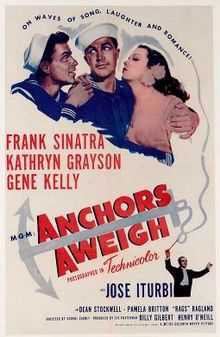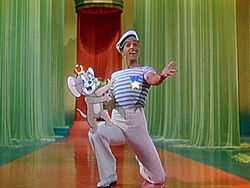Anchors Aweigh (film)
| Anchors Aweigh | |
|---|---|
 original poster | |
| Directed by | George Sidney |
| Produced by | Joe Pasternak |
| Written by |
Natalie Marcin (story) Isobel Lennart |
| Starring |
Frank Sinatra Kathryn Grayson Gene Kelly |
| Music by |
Georgie Stoll (musical direction) Axel Stordahl (orchestrations) Calvin Jackson (incidental music) |
| Cinematography | Charles P. Boyle |
| Edited by | Adrienne Fazan |
Production company | |
| Distributed by | Turner Entertainment (current) |
Release dates |
|
Running time | 143 minutes |
| Country | United States |
| Language | English |
| Budget | $2,580,000[1] |
| Box office | $7,475,000[1][2] |
Anchors Aweigh is a 1945 American Technicolor musical comedy film directed by George Sidney and starring Frank Sinatra, Kathryn Grayson, and Gene Kelly, in which two sailors go on a four-day shore leave in Hollywood, accompanied by music and song, meet an aspiring young singer and try to help her get an audition at Metro-Goldwyn-Mayer. In addition to a live-action Kelly dancing with Jerry Mouse the cartoon mouse, the movie also features José Iturbi, Pamela Britton, Dean Stockwell, and Sharon McManus.[3]
Plot
Joe Brady and Clarence Doolittle are Navy sailors who have a four-day leave in Hollywood. Joe has his heart set on spending time with his girl, the unseen Lola. Clarence, the shy choir boy turned sailor, asks Joe to teach him how to get girls. Donald, a little boy who wants to join the navy, is found wandering around the boulevard by a cop, who takes him to the police station. Clarence and Joe end up being picked up by the cops to help convince Donald to go home. After the two sailors wait at home and entertain Donald, Donald's Aunt Susie arrives. Clarence is smitten with her from the beginning. Susan goes on to tell them that she has been trying to find work in music, and longs to perform with José Iturbi. Trying to make Susan impressed with Clarence, Joe tells her that Clarence is a personal friend of Iturbi, and that he has arranged an audition for Susan with him. That night, they go out to a cafe, where Clarence meets a girl from Brooklyn, and they hit it off. The next day, Joe visits Donald's school, and tells the kids the story of how he got his medal, and how he brought happiness to a lonesome king (played by Jerry Mouse of Tom and Jerry), and joy to the forest animals of the kingdom.
Meanwhile, Clarence has been trying to get into Metro-Goldwyn-Mayer Studios to find Iturbi with no luck. After many failed attempts to find Iturbi, all hope is lost for Joe and Clarence, who want to come clean with Susan and tell her there was no audition. On Clarence and Joe's last day of leave, Susan runs into Iturbi at a café, who has no idea of the audition. Susan begins to call Joe, whom by now she has fallen in love with, to yell at him. Iturbi stops her and agrees to get her a screen test, which turns out to be very successful. The movie ends as Iturbi conducts the choir in singing "Anchors Aweigh", and Joe, Susan, Clarence and the girl from Brooklyn kiss.
Cast
- Frank Sinatra – Seaman First Class Clarence "Brooklyn" Doolittle
- Kathryn Grayson – Susan Abbott
- Gene Kelly – Gunner's Mate Second Class Joseph "Joe" Brady
- José Iturbi – Himself
- Dean Stockwell – Donald Martin
- Billy Gilbert- Café Manager
- Pamela Britton – The Girl From Brooklyn
- Leon Ames – Admiral's aide reads citation for medals
- Grady Sutton – Bertram Kraler
- Sara Berner – Jerry Mouse (in Tom and Jerry cartoon sequence)
Songs
- "Main Title" – MGM Studio and Orchestra
- "Anchors Aweigh" – MGM Studio and Orchestra and Jose Iturbi
- "We Hate to Leave" – Gene Kelly & Frank Sinatra
- "Brahms's Lullaby" – Frank Sinatra (Sang to Donald to come back again with Joe)
- "I Begged Her" – Gene Kelly & Frank Sinatra
- "If You Knew Susie" – Frank Sinatra & Gene Kelly
- "Jealousy – Kathryn Grayson
- "What Makes the Sunset" – Frank Sinatra
- "(All of a Sudden) My Heart Sings" – Kathryn Grayson
- "The Donkey Serenade" – Jose Iturbi
- "The King Who Couldn't Sing and Dance" – Gene Kelly
- "The Worry Song" – Gene Kelly & Sara Berner (as Jerry Mouse from the cartoons "Tom and Jerry")
- "The Charm of You" – Frank Sinatra (featuring a rare appearance of Guitarist Benito Mayorga with the orchestra)
- "Las Chiapanecas" – Gene Kelly & Sharon McManus
- "Liszt's Hungarian Rhapsody No. 2" – Jose Iturbi
- "I Fall in Love Too Easily" – Frank Sinatra
- "La cumparsita" – Gene Kelly (Music by Francisco Mayorga and "The Guadalajara Trio")
- "Waltz Serenade" – Kathryn Grayson - Pyotr Ilyich Tchaikovsky
- "Anchors Aweigh (Reprise)" – Dean Stockwell
- "Anchors Aweigh (Reprise 2)" – MGM Studio and Orchestra Chorus (THE END)
Background
The movie was written by Natalie Marcin and Isobel Lennart and directed by George Sidney. It was the first of three buddy pictures teaming the cocky dancing Kelly with the (against type) shy singing Sinatra, followed by Take Me Out To The Ball Game and On the Town, both in 1949. The production tried to mix some of the more successful story elements and set-pieces from earlier MGM musical hits, such as Meet Me in St. Louis.
It won the Academy Award for Best Music, Scoring of a Musical Picture, which was received by the musical director Georgie Stoll. In 2001, Kevin Spacey purchased this Oscar statuette at a Butterfield & Butterfield estate auction and returned it to the Academy of Motion Picture Arts and Sciences. Anchors Aweigh was also nominated for Best Actor in a Leading Role (Gene Kelly), Best Cinematography, Color (Robert Planck, Charles P. Boyle), Best Music, Song (for Jule Styne (music) and Sammy Cahn (lyrics) for "I Fall in Love Too Easily") and Best Picture.

The movie is famous for a musical number where Gene Kelly dances seamlessly with the animated Jerry Mouse (voiced by Sara Berner). Tom Cat appears briefly as a butler in the sequence supervised by William Hanna and Joseph Barbera. The animation was entirely done by veterans Kenneth Muse, Ray Patterson and Ed Barge. Originally, the producers wanted to use Mickey Mouse for this segment. Some sources claim Walt Disney initially agreed to loan out Mickey, but Roy Disney rejected the deal. According to Bob Thomas's book on Roy Disney, the studio was in debt after World War II and they were focusing on trying to get their own films out on time. According to Roy, they had no business making cartoons for other people.[4]
The film offers rare color glimpses of the wartime MGM studio, including the Thalberg Building, the frontgate, the backlot, the commissary, and one of the scoring stages, as well as an on-screen performance by real members of the MGM studio orchestra. There is also a memorable scene at the Hollywood Bowl, where Sinatra sings "I Fall in Love Too Easily", after Iturbi and a group of young pianists have performed an arrangement of Franz Liszt's Hungarian Rhapsody No. 2. In the audition scene with Iturbi, Grayson sings a special arrangement by Earl Brent for coloratura soprano and orchestra of the waltz from Pyotr Ilyich Tchaikovsky's Serenade for Strings. And Iturbi conducts the United States Navy Band for a patriotic rendition of the title tune. Many of the memorable scenes in this film were later featured in the That's Entertainment! tributes to MGM.
Reception
According to MGM records the film earned $4,498,000 in the US and Canada and $2,977,000 elsewhere, resulting in a profit of $2,123,000.[1]
Awards and nominations
- Winner: Academy Award, Original Music Score, Georgie Stoll (although the contributions of one of the first black composers and pianists in the MGM music department, Calvin Jackson, went uncredited,[5] this was not uncommon even for white studio musicians)
- Nominated: Academy Award, Best Picture
- Nominated: Academy Award, Best Actor, Gene Kelly
- Nominated: Academy Award, Best Cinematography (Color)
- Nominated: Best Song, "I Fall In Love Too Easily" (Words and Music by Sammy Cahn and Jule Styne, Sung by Frank Sinatra)
In popular culture
- Paula Abdul was inspired by the scene of Kelly dancing with Jerry to create the video for her song "Opposites Attract", where she dances with an animated cat.
- Several Tom & Jerry shorts have bits from The Worry Song scene played in their score. Mainly when it's Jerry's moment.
- Family Guy episode "Road to Rupert" reworked the Jerry Mouse dancing scene replacing Jerry with Stewie Griffin, though Jerry's reflection on the floor is still visible.
References
- ↑ 1.0 1.1 1.2 The Eddie Mannix Ledger, Los Angeles: Margaret Herrick Library, Center for Motion Picture Study.
- ↑ "All-Time Top Grossers", Variety, 8 January 1964 p 69
- ↑ Higham, Charles; Greenberg, Joel (1968). Hollywood in the Forties. London: A. Zwemmer Limited. p. 85. ISBN 978-0-498-06928-4.
- ↑ Bob Thomas. "Building a Company: Roy O. Disney and the Creation of an Entertainment Empire." Eventually Disneys lent out their effects wizard Joshua Meador to spruce up MGM's 1956 Forbidden Planet.
- ↑ Clora Bryant & Steven Isoardi (1999), Central Avenue Sounds: Jazz in Los Angeles, University of California Press, p. 68.
Further reading
- Monder, Eric (1994). George Sidney:a Bio-Bibliography. Greenwood Press. ISBN 9780313284571.
External links
- Anchors Aweigh at the Internet Movie Database
- Anchors Aweigh at the TCM Movie Database
- Anchors Aweigh at AllMovie
| ||||||